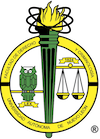Democratic strengthening
Its tripartite cohesion
DOI:
https://doi.org/10.29105/dj2.3-25Keywords:
Democracy, State, Tripartite Government, PowersAbstract
Throughout history talking about democracy has been an obligatory reference turning to the past (6th and 5th centuries BC), passing from the old content (government of the many), to the modern (heir to the liberal tradition). It is worth mentioning that the conditions of democracy as a political regime, introduce us to the model of the said regime and the institutions that are put in place to enforce it, considering the option between the presidential or parliamentary, semi-presidential or semi-parliamentary system, when we know (before the current government), there was a transition from a weakened presidential system and a Blocking Congress to one (again as in times past), with a majority in the Chambers. Accepting the genetic integration of its three contents, not in an isolated but in total cohesion, democracy, in addition to being a legal structure or political regime, is also a way of life based on the constant improvement of economic, social, and cultural of the people. The ultimate goal is to achieve compliance with the Temporary Public Good of the State.
Downloads
References
ALARCÓN REQUEJO, Gilmer, Estado Democrático de Derecho, Economía. Revista en Cultura de la Legalidad, Número 8, marzo-agosto pp. 229-241, 2015, https://e-revistas.uc3m.es/index.php/EUNOM/article/view/2490/1373
CASTELLANOS, G.M.E, Del Estado de Derecho al Estado de Justicia, 2ª. Edición, Porrúa, México, Universidad Autónoma de Baja California, 2009.
CEREZO TOMÁS, Francisco, Benjamin Constant. Discurso sobre la Libertad de los Antiguos comparada con los Modernos, https://www.academia.edu/36083932/BENJAMIN_CONSTANT_DISCURSO_SOBRE_LA_LIBERTAD_DE_LOS_ANTIGUOS_COMPARADA_CON_LA_DE_LOS_MODERNOS_
REAL ACADEMIA ESPAÑOLA, Diccionario, https://dle.rae.es/?w=democracia
CONSTITUCIÓN POLÍTICA DE LOS ESTADOS UNIDOS MEXICANOS, Diario Oficial de la Federación 28 de Mayo 2021, Art.3º, Texto Vigente, https://www.diputados.gob.mx/LeyesBiblio/ref/cpeum.htm
GIL DE GÓMEZ PÉREZ –ARADROS, Carlos, ¿Qué democracia tenemos? Democracia Real y Democracia Liberal Representativa? Nómadas. Revista Crítica de Ciencias Sociales y Jurídica, Volumen 40, número 4, 2013, https://revistas.ucm.es/index.php/NOMA/article/view/48336/45220
_________________________________________Élites Tecnócratas y Ciudadanía: hacia una democracia débil, Nómadas, Critical Journal of Socialand Juridical Sciences, Volumen 35, número 3, 493-506, 2012, https://revistas.ucm.es/index.php/NOMA/issue/view/2402
MOREIRA NETO, Diego de Figueiredo, Nuevas Funciones Constitucionales en un Estado Democrático de Derecho. Un estudio de caso en Brasil, Revista de Administración Pública, Número 183, pp. 9-29, septiembre-diciembre, Madrid, http://www.cepc.gob.es/publicaciones/revistas/revista-de-administracion-publica/numero-183-septiembrediciembre-2010-3
NACIONES UNIDAS, Fortalecer la resiliencia democrática para afrontar futuras crisis, https://www.un.org/es/observances/democracy-day
NOHLEN, Dieter, Presidencialismo versus Parlamentarismo: dos enfoques contrapuestos, Revista de Estudios Políticos (Nueva Época) Enero-marzo, 1998, https://recyt.fecyt.es/index.php/RevEsPol/article/view/45215/26746
OFICINA DEL ALTO COMISIONADO, NACIONES UNIDAS DERECHOS HUMANOS, Normas Internacionales, ACNUDH 1996-2022, https://www.ohchr.org/es/international-standards
RICCOBONO, Francesco, Democracia y Constitucionalismo, Derechos y Libertades, Número 37, Época II, pp. 17-29, 2017, https://e-archivo.uc3m.es/bitstream/handle/10016/27133/DyL-2017-37-riccobono.pdf?sequence=1&isAllowed=y
RESNIK, Philip, 2007, La democracia del siglo XXI, editorial Anthropos, 2007, España.
VALADÉS, Diego, El Sistema Presidencial Mexicano. Actualidad y Perspectivas, Boletín Mexicano de Derecho Comparado, Nueva Serie, Año XLIV, Número 130, Enero-Abril, Instituto de Investigaciones Jurídicas. UNAM, pp.283-307, 2011, http://www.scielo.org.mx/pdf/bmdc/v44n130/v44n130a9.pdf
Downloads
Published
How to Cite
Issue
Section
License
Copyright (c) 2022 Journal of Legal Challenges

This work is licensed under a Creative Commons Attribution-NonCommercial 4.0 International License.
The authors who publish in this journal accept the following conditions:
- Authors will retain their copyright and guarantee the journal the right of first publication of their work, which will be simultaneously subject to the Creative Commons Attribution-NonCommercial 4.0 International License. That allows third parties to share the work as long as its author and its first publication are indicated in this magazine.
- Authors may make other independent and additional contractual agreements for the non-exclusive distribution of the version of the article published in this journal (eg, include it in an institutional repository or publish it in a book) provided that they clearly indicate that the work it was first published in this magazine.
- Authors are allowed and recommended to publish their work on the Internet (for example on institutional or personal pages) after the review and publication process, as it can lead to productive exchanges and a greater and faster dissemination of the published work ( See The effect of open access).







